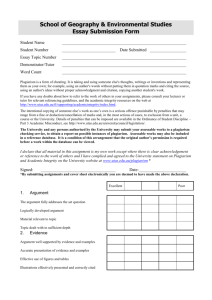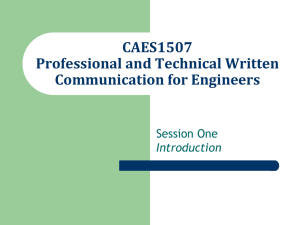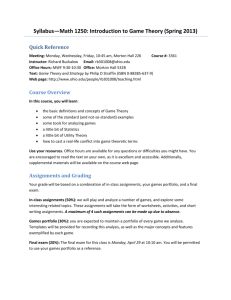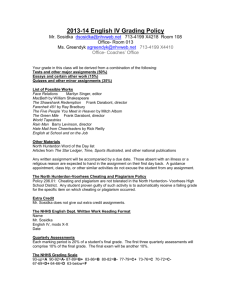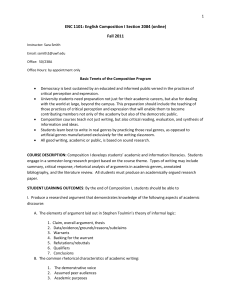ENGLISH 1001 - georgie ziff class website / FrontPage
advertisement
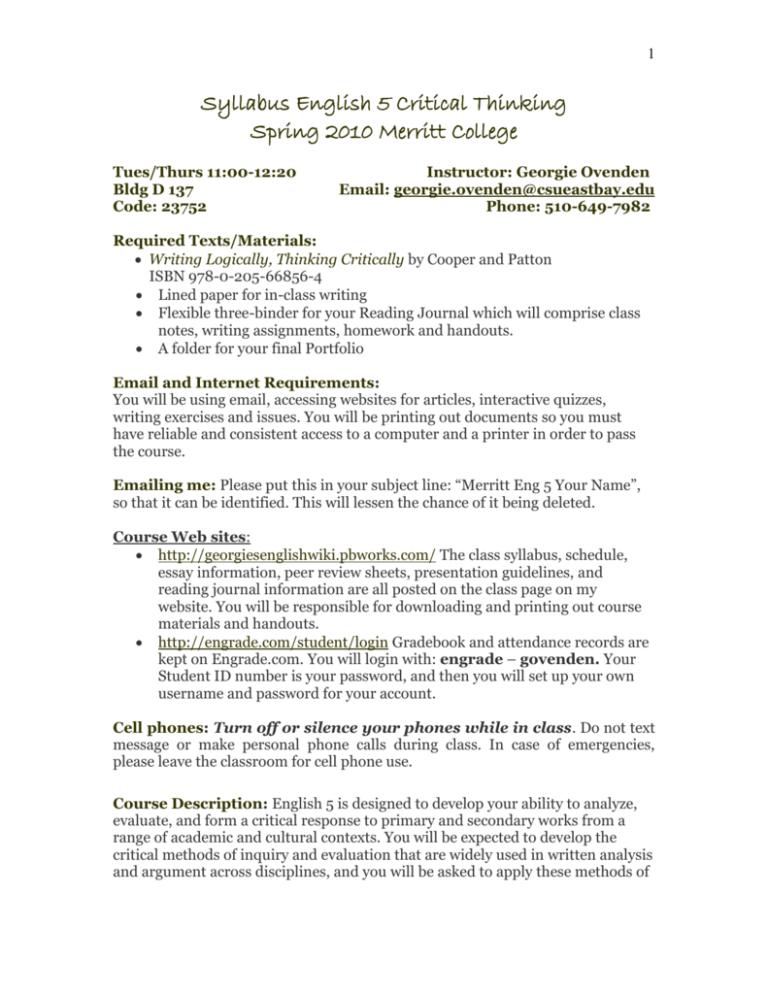
1 Syllabus English 5 Critical Thinking Spring 2010 Merritt College Tues/Thurs 11:00-12:20 Bldg D 137 Code: 23752 Instructor: Georgie Ovenden Email: georgie.ovenden@csueastbay.edu Phone: 510-649-7982 Required Texts/Materials: Writing Logically, Thinking Critically by Cooper and Patton ISBN 978-0-205-66856-4 Lined paper for in-class writing Flexible three-binder for your Reading Journal which will comprise class notes, writing assignments, homework and handouts. A folder for your final Portfolio Email and Internet Requirements: You will be using email, accessing websites for articles, interactive quizzes, writing exercises and issues. You will be printing out documents so you must have reliable and consistent access to a computer and a printer in order to pass the course. Emailing me: Please put this in your subject line: “Merritt Eng 5 Your Name”, so that it can be identified. This will lessen the chance of it being deleted. Course Web sites: http://georgiesenglishwiki.pbworks.com/ The class syllabus, schedule, essay information, peer review sheets, presentation guidelines, and reading journal information are all posted on the class page on my website. You will be responsible for downloading and printing out course materials and handouts. http://engrade.com/student/login Gradebook and attendance records are kept on Engrade.com. You will login with: engrade – govenden. Your Student ID number is your password, and then you will set up your own username and password for your account. Cell phones: Turn off or silence your phones while in class. Do not text message or make personal phone calls during class. In case of emergencies, please leave the classroom for cell phone use. Course Description: English 5 is designed to develop your ability to analyze, evaluate, and form a critical response to primary and secondary works from a range of academic and cultural contexts. You will be expected to develop the critical methods of inquiry and evaluation that are widely used in written analysis and argument across disciplines, and you will be asked to apply these methods of 2 analysis and argument in analytical papers and in class discussions and presentations. Student Learning Outcomes: * Apply active reading strategies in order to identify main ideas and critically analyze and explain ideas in texts * Evaluate the pattern of reasoning present in an argument and related critical evaluation, including induction, deduction and the logical fallacies * Apply fundamentals of critical thinking to writing well organized, well developed, effective, well edited, cited, logically sound essays and a research paper * Practice the conventions of academic writing, including introduction to Modern Language Association (MLA) documentation style of citation. Course Assignments: There will be 7 out of class mini writing assignments. Your drafts will be peer-reviewed in class, which will be submitted with the assignments. Chapter 1 - Thinking and Writing - a Critical Connection Considering Audience and Purpose p. 15 Chapter 2 - Inference - Critical Thought Interpreting Fiction p. 46 Chapter 3 - The Structure of Argument Summarizing an Article p.70 Chapter 4 - Written Argument Taking a Stand p.102 Chapter 5 - The Language of Argument - Definition Composing an Argument Based on a Definition p.124 Chapter 6 - Fallacious Arguments Analyzing an Extended Argument p.151 Chapter 7 - Deductive and Inductive Argument Questioning Generalizations p.196 Writing Format Guidelines: * MLA formatting typed 3 double spaced one inch margins size 12 standard fonts your name in the upper left corner of your first page page numbers in the upper right corner. Group Presentations: In a group of 3 or 4 of your classmates, you will present a topic or an article about writing to the class. This is a broad topic that will need narrowing down. You and your group may browse my website for ideas, but you aren’t limited to those resources. You will then present your topic, and develop an activity for the class to participate in that will teach the class. Your goal should be not only for the class to understand the topic, but also to apply what you are showing them. Try to make your presentation clear, thorough, and fun for the class. Reading Journal – get a flexible 3 ring loose leaf binder in which to collect your in class writing exercises. I will collect them periodically. Your entries will be in response to specific questions and in-class writing exercises that you do. During the quarter, you will be responsible for keeping track of all your work. Portfolio – There is no Final Exam in this course, but your Final essay is due with your Portfolio the last day of class. See the website for the Portfolio Guidelines. Final Class Writing Analysis – You will come to the Computer Lab at the last class meeting and write an analysis of ONE of the three essays in the back of the text (p. 215). You will pick an essay and respond the questions the follow the essay, and then submit your work online at the end of the class period. Grading in this course: * Seven writing assignments are worth 60% of your grade. * Homework assignments are worth 10% of your grade. * The Class Presentation counts for 5 % of your grade. * Reading Journal counts for 5% of your grade. * Portfolio counts for 10% of your grade. * Final Class Writing Analysis counts 5% of your grade * Attendance and class participation counts for 5% of your grade Grading Contract: You will receive a guaranteed C in the course if you submit all the work. To receive a B or an A in this course requires you to do more than show up and turn work in. You must display effort, enthusiasm, and improvement. Attendance and Participation Consistent attendance is very important, as the work we do in class is directly related to your success. If you do miss a class it is your responsibility to check your class page on my website for your schedule and assignments, and find out 4 from classmates about what you missed in class; exchange contact information with classmates. As this class meets twice per week, a student who misses more than three of the classes, regardless of the reason, will have their grade reduced by one full grade. A student who misses more than five classes will automatically fail the course. Students arriving more than 15 minutes late will be considered absent for the entire class. In-Class Etiquette In this class, there will be a lot of discussion. We will all be attempting to answer questions, voice opinions, agree and/or disagree with each other, and present findings. None of this is possible unless we create a comfortable environment. To do this, a few rules apply: 1. Keep cell phones/beepers on vibrate or silent. 2. Do not text during class – you need to pay attention to the work. 3. Be on time! 4. Show respect for your classmates and their ideas. During discussions, many different opinions will be expressed. All are welcomed and none are to be ridiculed. 5. Use appropriate language during discussion. 6. Refrain from expressing disgruntlement during class. See me outside of class about any concerns. Academic honesty and plagiarism policy: Cheating or plagiarism will not be tolerated and will result in severe disciplinary action. Students are required to attend the class on plagiarism and pass the plagiarism quiz. Cheating is defined as possessing unauthorized sources of information during an exam; copying the work of another student during an exam; completing an assignment for another student; submitting out-of-class work for an in-class assignment; retaining exams or other materials after they were supposed to be returned to the instructor; submitting the same paper for two different classes without approval of both instructors; and inventing data or falsifying an account of data collection. Plagiarism is taking the words of another and either copying or paraphrasing those words without giving credit to the source (through parenthetical citations, quotation marks, reference citations, all of which we will go over in class). This includes using material from the Internet without citing correctly. I am required to file a report of academic dishonesty with the Department of Academic Affairs should an act of plagiarism occur. The first incidence of plagiarism will result in an “F” on the assignment and you will be reported to the Dean of the College. If plagiarism occurs a second time, you will fail the course. Grievance Policy English Department Grievance Policy: All student grievances concerning grading or other areas are to be brought to the attention of the course instructor before any other action can be. If you cannot find a resolution to your grievance, then 5 you and your instructor will meet with the head of the composition program or the Dean of the English Department. Disability Accommodations If you have a documented disability and wish to discuss academic accommodations, or if you would need assistance in the event of an emergency, please contact me as soon as possible. Final notes: This syllabus is subject to change as needed. I may also assign individualized homework to help you improve particular writing skills.
